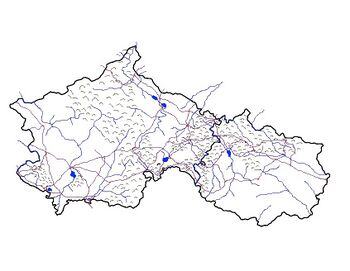Geography of Blechingia: Difference between revisions
Jump to navigation
Jump to search
No edit summary |
No edit summary |
||
| Line 17: | Line 17: | ||
| percent land = | | percent land = | ||
| percent water = | | percent water = | ||
| km coastline = | | km coastline = 1,870 | ||
| miles coastline = | | miles coastline = 1,161.9 | ||
| borders = [[Lyonheimer]], [[Medovia]], [[South Eisennau]] | | borders = [[Lyonheimer]], [[Medovia]], [[South Eisennau]] | ||
| highest point = [[Mt. Adian]] <br> | | highest point = [[Mt. Adian]] <br> | ||
| Line 32: | Line 32: | ||
| environmental issues = | | environmental issues = | ||
}} | }} | ||
==General characteristics== | |||
==Physiographic divisions== | |||
==Climate== | |||
==Natural disasters== | |||
==Public lands== | |||
Revision as of 14:42, 10 March 2021
 | |
| Continent | Thrismari |
|---|---|
| Area | |
| • Total | 1,022,058 km2 (394,619 sq mi) |
| Coastline | 1,870 km (1,160 mi) |
| Borders | Lyonheimer, Medovia, South Eisennau |
| Highest point | Mt. Adian 4,838.4 m (15,874 ft) |
| Lowest point | Slob Theas -2 m (-6.5 ft) |
| Longest river | River McKenna |
| Largest lake | Heilagulvath |
| Climate | Diverse: Ranges from Tundra in the extreme southern islands, To tagia in the south mostly along the coast. To temperate broadleaf forest for the large vast majority, To temperte steppe in the western and northern parts, To alpine tundra and montane forest mostly in the mountainous regions. |
| Terrain | Vast central plain, Interior Highlands and low mountains in Southwest,mountains and valleys in the mid-south, coastal flatland near Ice Sea and Strait of Lir, rugged, volcanic topography in Étaín. |
| Natural Resources | coal, copper, lead, molybdenum, phosphates, rare earth elements, uranium, bauxite, gold, iron, mercury, nickel, potash, silver, tungsten, zinc, petroleum, natural gas, timber, arable land |
| Natural Hazards | tsunamis; volcanoes; earthquake activity around Ice Sea, forest fires, permafost in southern Étaín |